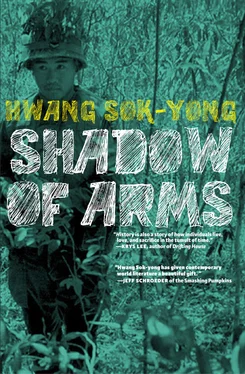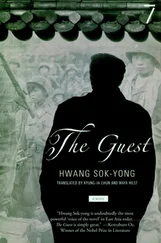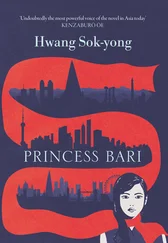In the case of non-uniformed men identifying themselves as NLF combatants, whether in the jungle or in the city, once taken they would be treated as spies and, following the precedent of World War II, could be executed on the spot. If they sometimes were taken prisoner and interrogated or handed over to the Vietnamese prisoner-screening units, it was purely because of the information that might be extracted.
In fact, in operation areas everything moving was treated as the enemy. Even a slow-moving water buffalo would send the helicopters into the air to strafe it, lest there be some bomb strapped to the beast or some combatants using it as a shield. But it is racism, in the end, that makes a person insist that a massacre is justified. American soldiers think it absurd to fight and die for some yellow people who relieve themselves outdoors and whose so-called food is filthier than the garbage in trash cans back home. Even so, they have to fight on somebody’s behalf, not on behalf of dollars. Even the killing — in the air it is a matter of technology and on the ground a game like Cowboys and Indians. But they have to do it for someone. If a soldier in a platoon is blown to bits by a booby trap, retaliation has to be wiping out an entire village. Nothing is left alive. Even the rice fields are torched.
“What are you looking at?”
Yong Kyu turned about to find Major Krapensky walking into the office. He was in full military uniform. Yong Kyu rose and awkwardly saluted.
“I asked him to make a memo on the case,” Captain Kim said.
“I thought you were interested in the black market,” the major said with a little frown.
“You look sharp. You can tell you’re a real soldier,” the captain said, changing the subject.
“Of course, I think a uniform suits me best.”
“What’s going on? A party?”
“I was summoned to appear as a witness in court.”
The captain held up the report in his hand.
Once more Major Krapensky frowned and said, “I don’t think this is in your jurisdiction.”
“I obtained some reference materials from the Vietnamese side. We have to be in the know. We encounter this kind of case almost every day in field operations.”
A smile appeared on Krapensky’s face. He offered a cigarette to the captain and even lit it for him.
“Have you ever handled a similar case?”
“No, we’re pretty busy.”
“Dignity is the marking of a gentleman. It’s a saying we have.”
“Dignity, and not hypocrisy?” said the captain, turning to look back at Yong Kyu with a smile.
“Captain, you speak English well,” the major said calmly. “That war is irrational is a given. There are times when you can’t completely ignore that fact, can’t totally avoid acknowledging it. A confession of faith is not merely an act to cleanse past sins, it is also to expiate sins one might commit in days to come.”
“Are you a Christian, Major?”
“All Americans are believers in Christianity and are to some degree Christians. Captain, I didn’t come here for a discussion. Just like neither one of us came to Vietnam for a discussion.”
“I was just joking. You’re always joking with me, no? You made a lot of jokes based on your services days in Korea.”
“That’s true. The French and the British may look alike to you. Likewise, I can’t tell the difference between you people and the Vietnamese.”
“Anyway, we’ve come here for the same purpose, right?”
At those words from the captain, the major shook his head and laughed, “No, you came here to make money. I’m joking, don’t take it the wrong way. . ”
Yong Kyu gathered his words in his head before he opened his mouth.
“The allied forces always have only one purpose.”
The major peered silently down at Yong Kyu with wide eyes, glanced at his watch, and turned away. Yong Kyu saluted him.
As soon as he sat down, the captain said coldly, “Nice of you to try to help, but in the future watch your step.”
“Yes, understood, sir.”
Yong Kyu returned to work on the memo covering the case.
Concerning the Rape-Murder of a Vietnamese Women
Interrogation in the Presence of Major Krapensky, First Lieutenant Mersee, and Sergeant Lucas
Complainant: PFC Sven Ericsson (Age 23, born Minnesota)
Accused (4): SSG Tony Misova (Age 20, born Upper State New York on Canadian border, career soldier, 3 years in field)
CPL Ralph Clark (Age 22, born Philadelphia)
PFC Raphael Gomez (Age 21, born Texas)
PFC Manuel Gomez (Age 19, born Texas, cousin of Raphael)
Witnesses: 2d Lt. Harold Riley (Platoon Leader, born Oklahoma, black).
Phan Te Rok (Vietnamese, sister of victim, age 16, born Kattuong, Puye district of Khwang Kaesong)
Interrogator: Lieutenant Riley, before you confirm the charges made by Private Ericsson, please state the time, place, and nature of the mission during which the five soldiers were involved in the incident.
Riley: On November 16 I assigned Private Ericsson’s squad to a scouting mission. They were to patrol the mid-highlands in the area of Hill 192 in Bong Song Valley.
Interrogator: On what basis were they selected?
Riley: At the direct order of the battalion commander, I chose the best soldiers in the platoon. They all had a lot of experience in operations, and they were also all named by the company commander.
Interrogator: Go on.
Riley: On November 17 the newly-formed reconnaissance team was gathered at platoon headquarters in My Tho to be briefed. Needless to say, it would have been nice to find enemy forces and let loose with air-ground operations, but the battalion command had ordered that there was to be no engagement with the enemy unless absolutely unavoidable, as a self-protection measure. The recon team left the main body for five days’ encampment.
Interrogator: Private Ericsson, whose idea was it? Was it Misova’s?
Ericsson: Yes, he offered to kidnap a woman for the morale of the squad. He said we could enjoy the woman in turn for five days, and if we got rid of her before coming back then we couldn’t be prosecuted for kidnap and rape.
Interrogator: Why didn’t you report it to your superiors at that time?
Ericsson: I spoke to some of the others in the team, but they all laughed. These villagers who relieve themselves in the open and eat stuff filthier than our garbage back home, they are not humans like us. That was their answer.
Interrogator: Summarize the incident.
Ericsson: At 1640 the following morning, before we left the main body, Sergeant Misova lined us up for gear inspection. We had food, ammo, smoke grenades, and so on. About twenty minutes after we set out I realized we had marched about two kilometers to the east, the opposite direction from the way Misova had told us we would be moving. We got to Kattuong. Misova took Clark with him and combed the village. They had searched six houses without finding a single woman when Raphael pointed at a white hut with a thatched roof.
Interrogator: Who went in first?
Ericsson: Staff Sergeant Misova and Corporal Clark.
[Discussion with girl witness through Vietnamese military interpreter.]
Interrogator: Do you remember this soldier?
Phan Te Rok: I’m not sure. It was dark and I was terrified. Because of the commotion outside, my mother and my sister and I were all holding onto each other. Then the door burst open and a flashlight shone into the room. The light stopped on us.
Interrogator: Were there only three of you? Were you asleep?
Phan Te Rok: My sister Miao and my mother and I were already awake and talking to each other. My father had gone to the market at Pumi and the three of us were alone in the house. We bit our lips to keep from crying in fear and my mother held us in her arms. Two soldiers came in and separated us from our mother. Mother cried and begged. I was dragged outside, too, but my mother begged so desperately that they left me behind when they took my sister.
Читать дальше












